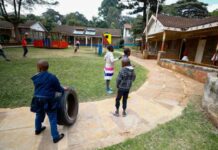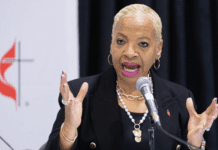Four days after Floyd’s death, Drumwright flew to Minneapolis. He befriended Floyd’s relatives and offered them pastoral care. In April of this year, he spent six weeks in Minneapolis escorting family members to the courthouse every day of Chauvin’s trial.
But Floyd’s death was just the beginning.
Drumwright swung into action on a host of other racial justice issues this past year — many closer to home. He and members of his newly built grassroots organization, Justice 4 the Next Generation (J4NG, for short), led half a dozen protests for greater racial justice in Alamance County, North Carolina, where the sheriff has employed aggressive policing tactics targeting Blacks and Latinos. More recently, Drumwright has traveled repeatedly to Elizabeth City on the state’s eastern edge, where last month an unarmed Black man was shot to death by sheriff deputies serving a drug-related search warrant.
Drumwright, too, acknowledged he’s seen some progress this past year for which he’s grateful. The Chauvin verdict was one example. He went up to Virginia to watch Gov. Ralph S. Northam sign Breonna’s Law banning no-knock warrants (named after Breonna Taylor, who was shot and killed when three officers used a no-knock warrant to enter her apartment.)
“The consciousness of America has been awoken and that’s why we’re continuing on in this journey, even beyond the anniversary of George Floyd,” Drumwright said. “Has it been enough? Not nearly.”
Howard University Divinity School and Sojourners, a Christian mobilizing and media organization, were already months into a new “ Theology and Racialized Policing Cohort Program ” when Floyd was killed. About 45 participants found themselves immediately putting into practice what they were learning.
“Several of our folks were speakers at protests and were articulating a theological voice in the midst of this time calling for accountability and transparency and justice,” said the Rev. Terrance McKinley, director of racial justice and mobilizing for Sojourners.
Since the predominantly Black but diverse group of clergy completed the certificate program last summer, they have been acting on lessons they learned: An African Methodist Episcopal Zion pastor is leading his Washington church to partner with a predominantly white Catholic church to focus on reconciliation and strategize to address local issues. A Baptist minister in Washington has developed a conduct code for her community and preaches more regularly about social justice. Participants from Virginia are seeking to create a local civilian oversight board and other means to investigate law enforcement violence.











